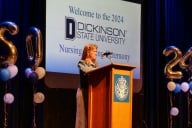You have /5 articles left.
Sign up for a free account or log in.
WASHINGTON -- A few years ago, organizers at the American Association of University Professors had to cancel a conference on shared governance for lack of interest. This year, they gave it another shot and were pleasantly surprised, to say the least: applications flooded in and they ultimately had to turn people away.
The AAUP conference served as a rallying point for 250 academics concerned about the state of shared governance at their institutions. They took charge at a Washington hotel this weekend, sharing war stories, exchanging advice and -- of course -- taking a few jabs at administrators.
"I don't believe all administrators are our enemies," AAUP President Cary Nelson said in his opening address, after repeatedly mocking "administrative wastes" and sending the audience into fits of laughter, "just some of them." Nelson bemoaned some of the worst violations of shared governance: plans at the University of Illinois at Urbana-Champagn, where he teaches, to slash humanities funding; and Rensselaer Polytechnic Institute's move to strip its faculty senate of power. "It's time to stand up for the values the AAUP articulated 100 years ago," Nelson said. "They are now under unique assault."
Attendees found solidarity among others who are fed up with similar experiences. A common theme of the workshops and panels was the loss of faculty consultation during financial crises, with panelists drawing on their institutions' experiences to offer advice and strategies to preserve shared governance. Audience members frequently chimed in with questions, and articulated their feelings of exclusion from administrative budgetary and academic decisions.
While the us vs. them mentality was certainly expressed by many attendees, it wasn't omnipresent. A handful of panelists took the opposite approach, pairing educators with administrators to demonstrate that it is indeed possible to work in harmony -- and echoing the conference theme that it's wrong to do anything but.
Joseph Gow and Carmen Wilson, chancellor and former faculty senate chair, respectively, at the University of Wisconsin at La Crosse, described an incident that unfolded about five years ago. The provost rejected a search committee's chosen candidate for a dean position -- without reviewing the candidate -- because she wanted multiple nominees. The nomination of multiple candidates wasn't stipulated in the search procedure, so conflict ensued: the provost chose to appoint as interim dean a candidate whom the search committee had deemed unacceptable, and the faculty senate ended up censuring the provost (the university is still in litigation with the candidate the provost would not consider).
The situation is a poignant example of why the AAUP believes shared governance is under siege: administrators are overruling faculty or not even considering them in the first place, occurrences that have become more commonplace as colleges' funding has dwindled. "Shared governance is not perfect, but that does not mean we're going to abandon it," Gow said. Wilson, who now works with Gow in the chancellor's office, added, "When both sides enter into it with good faith and they have some trust in each other, it can work." The lesson was one stressed by many panelists: communication -- before, during and after a process -- is key.
Such was the case at Christopher Newport University in Virginia, where faculty senate president Peter M. Carlson worked with administrators to minimize the educational impact of the budget crisis that began in 2008. It was the second financial disaster this decade, and Carlson didn't want a repeat experience of cut programs, majors and tenured faculty. "The last time we felt that faculty got crushed in the process," Carlson told Inside Higher Ed after he presented at the conference. "This time it was a different set of players."
Carlson, a professor of government and public affairs, united with co-panelist and Provost Mark W. Padilla to find alternative ways to save money. They cut 95 course sections and lost a few adjuncts but tenured and tenure-track faculty were, for the most part, protected. "We set out to carve a pathway that was clearly a joint effort by the administration and faculty," Carlson said. "Faculty are a creative lot when you can merge minds and hearts."
In an interview with Inside Higher Ed, Nelson said the AAUP had hoped to reach out especially to faculty senate leaders and explore how the bodies can become more vital, effective forces on campus. He said the high conference turnout signifies that senates are "waking up," and a critical mass may be approaching. "It's a clear sign that the higher education situation is changing," Nelson said. "People are starting to realize they can't solve these problems on their own.... They feel the faculty role is being circumscribed and they want advice on how to deal with it."
Some situations are more dire than others. Consider Kean University, which has for several years been in a high-profile, heated battle between faculty, administrators and unions that has been fueled by the closure of departments and a controversial president described as a top-down manager with no use for faculty input. Kean's associate vice president for academic affairs, Kenneth Sanders, and faculty senate chair, Barbara Lee, are trying to collaborate with the president to please all parties, but the wounds may run too deep. "We both believe in shared governance," Lee said, to which Sanders added an emphatic, "a lot."
But, as Lee put it, "governance is really -- should I say it? -- it's not in our president's vocabulary yet."
Perhaps Sanders and Lee will have better news to report at the next shared governance conference. Nelson expects that after this gathering's considerable success, the AAUP will want to organize another one.








